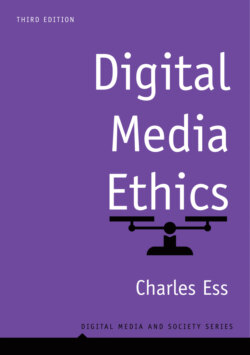Читать книгу Digital Media Ethics - Charles Ess - Страница 22
Further considerations: Ethical judgments
ОглавлениеAnother difficulty with the “moral panics” approach to ethical issues in the new mediascape is that it suggests that “ethics” works like this:
1 There are clear, universally valid norms of right and wrong that we can take as our ethical starting points – as premises in an ethical argument.1
2 All that “ethics” really involves is applying these initial premises to the particulars of the current case in front of us – in a straightforward deduction that concludes the right thing to do, as based on our first premises.
3 Once we have our ethical answers in this way, we can be confident that our answers are right; those who disagree with us must be wrong.
This approach to ethics is not necessarily mistaken; on the contrary, it seems that much of the time, most of us in fact do not perceive an ethical problem or difficulty in the situation we’re facing – because our ethical frameworks already provide us with reasonably clear and straightforward answers along just these lines. Most of us, for example, do not routinely lie, steal, or kill – despite sometimes what may be considerable temptations to do so – because we accept the general norms and principles that forbid such acts.
At the same time, however, this initial understanding of ethics obscures a number of important dimensions of ethical reflection.
To begin with, this initial approach runs counter to what seems actually to happen when we encounter genuine ethical problems and puzzles. Take, for example, the problem of downloading music illegally from the internet. We all know that this is illegal, but we are also influenced in our thinking by other considerations, e.g.:
I’m not likely to get caught, so there’s virtually no possibility that this will actually hurt me in some way.
The internationally famous musicians – and the multinational companies that sell their music as product for profit – are certainly wealthy enough. They won’t feel the loss of the 2 cents profit they would otherwise enjoy if I paid for the music.
Copyright laws are unfair in principle: they are written for the advantage of the big and already wealthy countries. Thus, I think illegal downloading by a struggling student in a developing country is a justified form of protest against multinational capitalism and its exploitation of the poor.
Whatever the law says, the law is the law: I think it should be respected so far as possible – not only in order to avoid punishment, but in order thereby to contribute to good social order.
Even if the chances of getting caught are vanishingly small, if I do get caught, the negative consequences would be enormous (fines, possibly problems at work, maybe even jail time). It’s not worth breaking the law to save a few bucks on music.
While internationally famous artists may not miss my contribution to their royalties, local and/or new artists certainly will. I’ll not rip them off by illegally copying their music – I’ll just order the song online or buy the CD instead.
The point here is not only that we are often pulled in competing directions by values and principles that appear to contradict one another. In addition, the more fundamental problem is: given the specific details of our particular situations, how do we know which principle, value, norm, rule, etc., is in fact relevant to our decision?
That is, in direct contrast to the “top-down” deductive model of ethical reasoning – i.e., one that moves from given general principles to the specifics of our particular case – this second ethical experience begins with the specifics of our particular case, in order then to try to determine (“bottom-up”) which general principles, values, norms, etc., in fact apply.
This second maneuver is thereby far more difficult, as it first requires us to judge – based on the particulars of our case – which general principles, norms, values, etc., apply to our case. Clearly, without such general principles, we cannot make a reasoned decision. But the great difficulty is this:
there is no general rule/procedure/algorithm for discerning which values, principles, norms, approaches apply; rather, these must be discerned and judged to be relevant in the first place, before we can proceed to any inferences/conclusions about what to do.
Aristotle referred to this kind of judgment as phronēsis – often translated as “practical judgment.” For Aristotle (and for many ethical traditions around the world), the development of this sort of practical judgment – i.e., one that can help us discern in the first place just which norms and values do apply to the particulars of a specific case – is an ongoing project that continues throughout one’s entire life. This is in part because it requires experience – both of successes and of failures – as these help us learn (oftentimes, the hard way) what “works” ethically and what doesn’t. The first time we try to learn a new skill or ability – say, ice-skating – we are certain to stumble and fall, perhaps catastrophically, and almost certainly more than once. Analogously, our first efforts to grapple with difficult ethical issues that require phronēsis do not always go well: we are caught in the ethical “bootstrapping” problem of needing precisely the ability to judge that will be robust enough to help only after it has been developed and honed through many years of (sometimes hard) experience.
The good news is that – however daunting all of this might seem – the Aristotelian view (among many others) argues that the vast majority of us are already ethical beings equipped with phronesis, and thereby the foundations and abilities for taking on these challenges.
